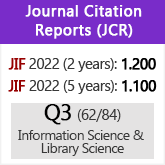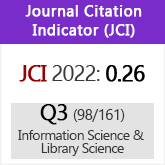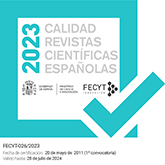An inferentialist conception regarding the co-authorship of scientific papers
DOI:
https://doi.org/10.3989/redc.2014.4.1145Keywords:
Co-authorship, scientific collaboration, reputation, social epistemology, inferentialism, institutions, intellectual property, argumentationAbstract
Co-authorship is very common in most areas of science and has grown as the complexity of research has increased the need for scientific collaboration. But plural authorship tends to complicate the attribution of merit to individual scientists, which is the basis of scientific evaluation. I argue that collaboration does not necessarily entail co-authorship, though in many cases the latter is an option that the individual scientists might not choose, at least in principle: individually authors might separately publish their own contribution to a collaborative project in which they had taken part, or papers could explicitly state what contribution each individual author had made. I ask, hence, why it is that scientists prefer to ‘pool’ their contributions instead of keeping them separate if they are pursuing, amongst other things, individual recognition. My answer, following an inferentialist approach to scientific knowledge, is based on the view of the scientific paper as a piece of argumentation rather than as a piece of knowledge.
Downloads
References
Beaver, D. (2001). Reflections on scientific collaboration (and its study): past, present, and future, Scientometrics, 52, (3), 365-377. http://dx.doi.org/10.1023/A:1014254214337
Biagioli, M. (1999). Aporias of Scientific Authorship: Credit and Responsibility in Contemporary Biomedicine, in M., Biagioli, ed., The Science Studies Reader, New York, London, Routledge, pp. 12-31.
Birnholtz, J. (2006). What does it mean to be an author? The intersection of credit, contribution and collaboration in science. Journal of the American Society for Information Science and Technology, 57, 1758-1770. http://dx.doi.org/10.1002/asi.20380
Brandom, R. (1994). Making it Explicit. Cambridge, MA: Harvard University Press.
Brandom, R. (2000). Articulating reasons: An introduction to inferentialism. Cambridge, MA: Harvard University Press.
Chompalov, I.; Genuth, J.; Shrum, W. (2002). The organization of scientific collaborations. Research Policy, 31, 749-767. http://dx.doi.org/10.1016/S0048-7333(01)00145-7
Coase, R. (1937). The Nature of the Firm. Economica, 4.16: 386–405. http://dx.doi.org/10.1111/j.1468-0335.1937.tb00002.x
Coase, R. (1960). The Problem of Social Cost. Journal of Law and Economics, 3, 1-44. http://dx.doi.org/10.1086/466560
Fallis, D. (2006). The epistemic costs and benefits of collaboration. The Southern Journal of Philosophy, 44, 197-208. http://dx.doi.org/10.1111/j.2041-6962.2006.tb00039.x
Glaenzel, W.; Schubert, A. (2004). Analysing scientific networks through co-authorship, in: Henk F., Moed et al., ed., Handbook of Quantitative Science and Technology Research. The Use of Publication and Patent Statistics in Studies of S&T Systems, Dordrecht, Boston, London, Kluwer Academic Publishers, pp. 257-276.
Goldman, A.; Whitcomb, D. (2010). Social Epistemology: Essential Readings, Oxford, Oxford University Press.
González de Prado Salas, J.; Zamora Bonilla, J. (2014). Collective actors without collective minds: an inferentialist approach. Philosophy of the Social Sciences. Publicado on-line 20/02/2014.
Hull, D. (1988). Science as a Process: An Evolutionary Account of the Social and Conceptual Development of Science, Chicago, The University of Chicago Press. http://dx.doi.org/10.7208/chicago/9780226360492.001.0001
LaFollette, M. C. (1992). Stealing into print: fraud, plagiarism, and misconduct in scientific publishing. University of California Press.
Laudel, G. (2001). Collaboration, creativity and rewards: why and how scientists collaborate. International Journal of Technology Management, 22, (7), 762-781. http://dx.doi.org/10.1504/IJTM.2001.002990
Laudel, G. (2002). What do we measure by co-authorships?. Research Evaluation, 11,(1), 3-15. http://dx.doi.org/10.3152/147154402781776961
Powell, W. W. (1990). Neither market nor hierarchy. Research in Organizational Behavior, 12, 295-336.
Rolin, K. (2010). Group justification in science", Episteme, 7, (3), 215-231. http://dx.doi.org/10.3366/epi.2010.0204
Thagard, P. (2006). "How to collaborate: procedural knowledge in the cooperative development of science", The Southern Journal of Philosophy, 44, 177-196. http://dx.doi.org/10.1111/j.2041-6962.2006.tb00038.x
Wittgenstein, L. (1988). Investigaciones Filosóficas. Barcelona: Crítica. Traducción de A. García Suárez y U. Moulines.
Wray, K. B. (2002). The epistemic significance of collaborative research. Philosophy of Science, 69, (1), 150-168. http://dx.doi.org/10.1086/338946
Wray, K. B. (2006). Scientific authorship in the age of collaborative research. Studies in History and Philosophy of Science, 37, 505-514. http://dx.doi.org/10.1016/j.shpsa.2005.07.011
Wuchty, S.; Jones, B. F.; Uzzi, B. (2007). The increasing dominance of teams in production of knowledge. Science, 316, (5827), 1036–1039. http://dx.doi.org/10.1126/science.1136099
Zamora Bonilla, J. P. (2002). Scientific Inference and the Pursuit of Fame: A Contractarian Approach. Philosophy of Science, 69, 300-23. http://dx.doi.org/10.1086/341055
Zamora Bonilla, J. P. (2006). Science as a Persuasion Game. Episteme, 2, 189-201. http://dx.doi.org/10.3366/epi.2005.2.3.189
Zamora Bonilla, J. P. (2007). Science Studies and the Theory of Games. Perspectives on Science, 14, 639-71.
Zamora Bonilla, J. P. (2010). What games do scientists play? Rationality, objectivity, and the social construction of scientific knowledge. EPSA Epistemology and Methodology of Science: Launch of the European Philosophy of Science Association (M. Suárez, ed.) pp. 323-332. Springer. Amsterdam.
Zamora Bonilla, J. P. (2011). Rationality in the social sciences: bridging the gap. The SAGE Handbook of the Philosophy of Social Science (eds. Ian Jarvie and Jesús Zamora-Bonilla). pp: 721-738. SAGE. London.
Published
How to Cite
Issue
Section
License
Copyright (c) 2014 Consejo Superior de Investigaciones Científicas (CSIC)

This work is licensed under a Creative Commons Attribution 4.0 International License.
© CSIC. Manuscripts published in both the printed and online versions of this Journal are the property of Consejo Superior de Investigaciones Científicas, and quoting this source is a requirement for any partial or full reproduction.All contents of this electronic edition, except where otherwise noted, are distributed under a “Creative Commons Attribution 4.0 International” (CC BY 4.0) License. You may read here the basic information and the legal text of the license. The indication of the CC BY 4.0 License must be expressly stated in this way when necessary.
Self-archiving in repositories, personal webpages or similar, of any version other than the published by the Editor, is not allowed.

















